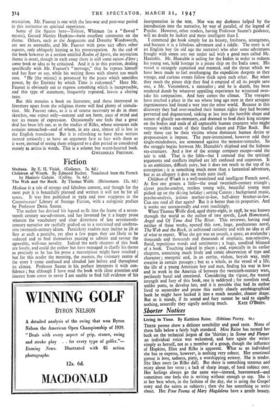Fiction
Medusa. By E. H. Visiak. (Gollancz. 7s. 6d.)
Children of Wrath. By Edmond Buchet. Translated from the French by Marjorie Gabain. (Collins. 7s. 6d.) The Web and the Rock. By Thomas Wolfe. (Heinemann. 12s. 6d.)
Medusa is a tale of strange and fabulous content, and though for the most part it is beautifully planned and written it will not be for all tastes. It was first published in 1929 and now reappears in the Connoisseurs' Library of Strange Fiction, with a eulogistic preface by Professor Denis Saurat.
The author has devised his legend to fit into the frame of a seven- teenth century sea-adventure, and has invented for it a happy prose wherein the vocabulary and clear directness of late seventeenth- century narrative are tactfully grafted on to a restrained and unobtru- sive twentieth-century idiom. Pernickety readers may incline to jib at first at such a pastiche, yet after a few pages they are likely to be seduced and to find themselves pausing to admire and savour the agreeable, well-run novelty. Indeed the early chapters of this book are lovely, and could the author but have managed to clarify his theme as precisely as he has his prose a masterpiece might have resulted - but for this reader the meaning, the essence, the visionary centre of the story I-came confused and clouded just before and throughout its climax. Professor Saurat in his preface interprets it with con- fidence; but although I have read the book with close attention and interest from cover to cover I am unable to find full evidence of his
interpretation in the text. Nor was my darkness helped by the introduction into the narrative, by way of parallel, of the legend of Psyche. However, other readers, having Professor Saurat's guidance, will no doubt be luckier and more intelligent than I.
I commend ..tbe book simply for its beauty, freshness, strangeness, and because it is a fabulous adventure and a riddle. The story is of an English boy (in old age the narrator) who after some adventures fraught with omen sets out under sail with a good man called Mr. Huxtable. Mr. Huxtable is sailing for the Indies in order to redeem his young son, held hostage in a pirate ship on the India coast. His vessel is strangely captained and manned, and the threat which we have been made to feel overhanging the expedition deepens as they voyage, and curious events f011ow thick upon each other. But when they reach the pirate ship they find it emptied of all its people save one, a Mr. Vertembrex, a naturalist ; and he is dumb, has been rendered dumb- by whatever appalling experience he witnessed over- take his companions. And here comes the climax. The voyagers have reached a place in the sea where long ago men in their arrogant ingeniousness had found a way into the other world. Because in this discovery they had over-reached their human rights they had become perverted and degenerated, sinking at last into the horrible shape and nature of ghastly sea-monsters, and doomed to feed their king octopus on the bodies and souls of all capturable human creatures who might venture within reach of their fearful chasm and Pillar Rock. But only those can be their victims whose dominant human desire or prepossession is impure. The pure-intentioned, however odd their single-mindedness, are armoured against the monster-tentacles. So the struggle begins between Mr. Huxtable's shipload and the hideous sea-creatures.. And a few of the strange company escape—and the tale is told. That is the fable—but I contend that the spiritual arguments and conflicts implied are left confused and unproven. It is an ambitious, difficult story, but it does not reach to the top of its conception ; it is something much more than a fantastical adventure, but as an allegory it does not truly state itself.
Children of Wrath is a well-translated and intelligent French novel. At first one groans a little—the usual twentieth-century triangle ; clever psycho-analyst, restless young wife, beautiful young man picked up on the ski-ing holiday ; setting Cannes ; background music, psycho-analysis, jealous mother-in-law, half-dotty brother-in-law. Can one read all that again? But it is better than its properties. And it works out unexpectedly and even touchingly. When Thomas Wolfe died, aged thirty-eight, in 1938, he was known through the world as the author of two novels, Look Homeward, Angel and Of Time And The River. This reviewer, having read neither of those works, opened this new, huge, posthumous novel, The Web and the Rock, in unbiassed curiosity and with no idea at alt of what to expect. What she got was an assault, a spate, an avalanche ; thousands and thousands and thousands of emphatic, non-selective, florid, repetitious words and sentiments ; a huge, unedited blizzard of a book. Touching indeed in places ; and, especially in its earlier chapters, containing much lively and comic observation of type and character ; energetic and, in an earthy, violent, boyish way, truly creative in certain passages ; but as a whole, as the vessel of a life, the life of a young American boy and man, finding his way in love and in work in the America of between the twentieth-century wars, perilously banal and emotional. Considering the vigour, the wasted strength and fury of this book, one is saddened ' • for novelists tend, unlike poets, to develop late, and it is possible that had its author lived to reconsider and prune this surely closely autobiographical book he might have hacked it into a much sounder, cleaner shape. But as it stands, if its sound and fury cannot be said to signifiy
nothing, assuredly they signify nothing much. KATE O'BEier.


































 Previous page
Previous page